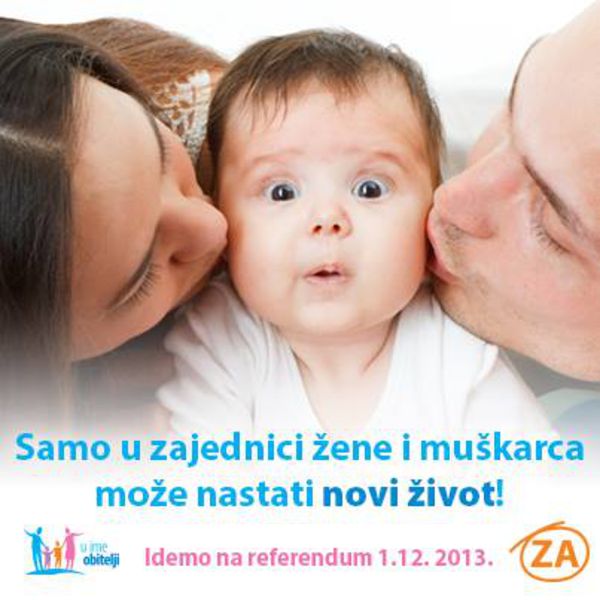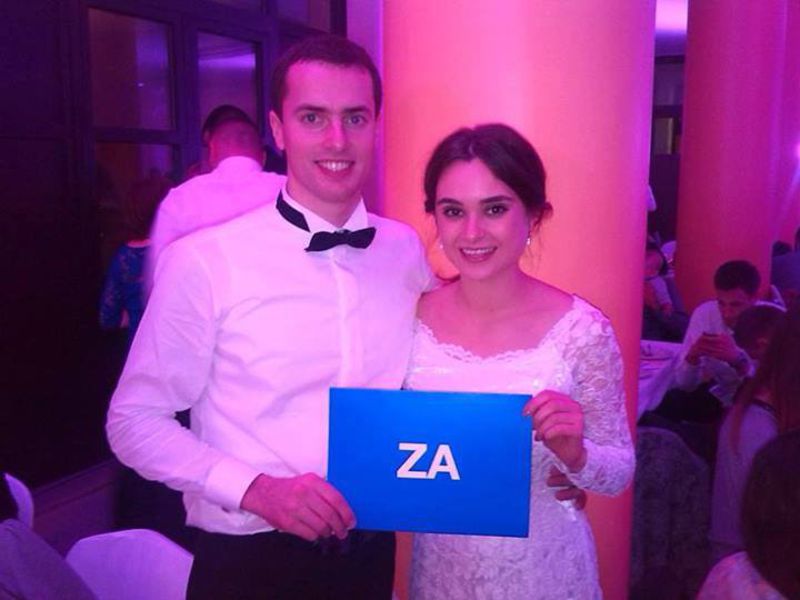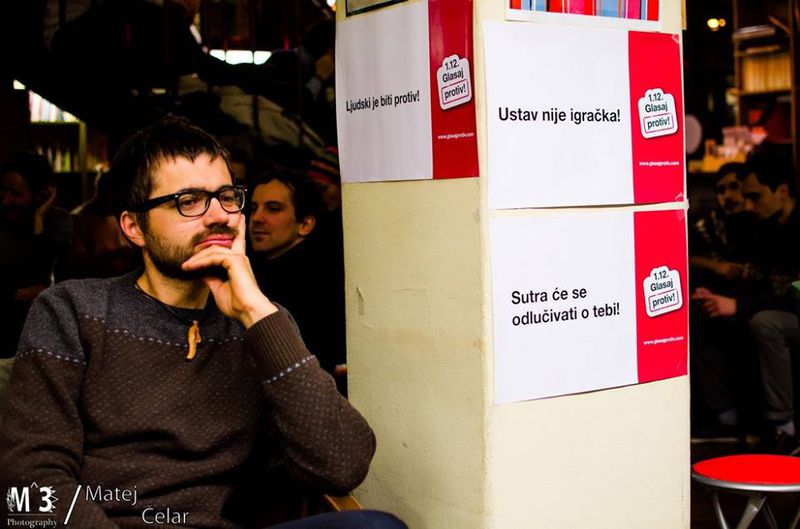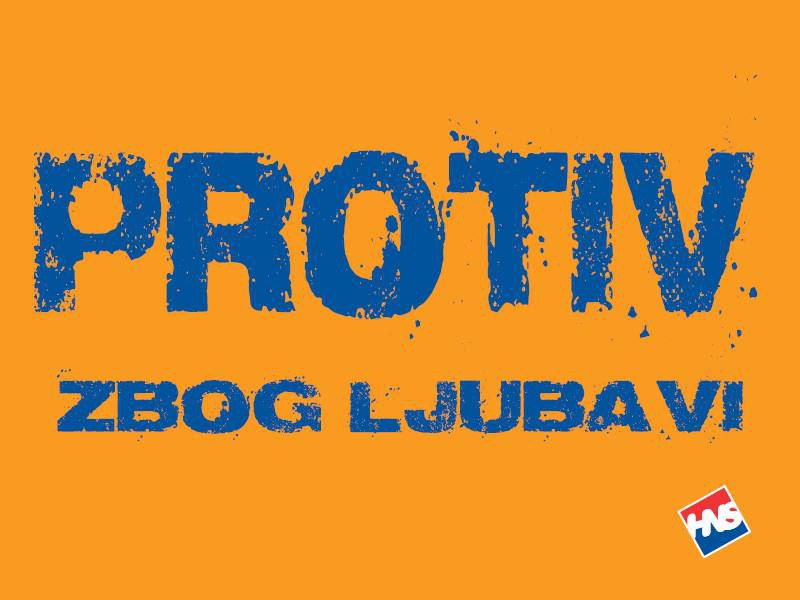Referenda Hysteria in Croatia
Adelina Marini, November 30, 2013
 There is no doubt the hottest topic in Croatia in the past weeks is about the third referendum since the country's independence. On December 1st, the Croats are invited to vote on whether to be explicitly stipulated in the Constitution that marriage is a union only between a man and a woman. Almost a year has passed since the issue entered the agenda of the Croatian society, when the initiative "In the name of family" started collecting signatures. Initially, things looked a bit funny until over 750 thousand signatures were collected from all over the country in support of a referendum. And although this will be the third public questioning, the Croats are not happy. On the contrary. Many of them believe that this is an unnecessary squandering of money for something no one needed right now. Just when unemployment is again skyrocketing after the season adjustments.
There is no doubt the hottest topic in Croatia in the past weeks is about the third referendum since the country's independence. On December 1st, the Croats are invited to vote on whether to be explicitly stipulated in the Constitution that marriage is a union only between a man and a woman. Almost a year has passed since the issue entered the agenda of the Croatian society, when the initiative "In the name of family" started collecting signatures. Initially, things looked a bit funny until over 750 thousand signatures were collected from all over the country in support of a referendum. And although this will be the third public questioning, the Croats are not happy. On the contrary. Many of them believe that this is an unnecessary squandering of money for something no one needed right now. Just when unemployment is again skyrocketing after the season adjustments.
And just when the European Commission recommended the Council to initiate an excessive deficit procedure against Zagreb which means more spending cuts, more layoffs, more unemployed, painful economic restructuring. Generally, a collapsing economy. Soon society, too, is about to collapse after a deep polarisation has begun during the commemoration of the anniversary of the destruction of Vukovar by the then Yugoslav People's Army (JNA). And the question "Do you support to insert a provision in the Constitution of the Republic of Croatia that marriage is only between women and men?", is on its way to polarise society again.
Why is the question about gay marriages important to the "In the name of family"?
The citizen initiative defends its position with several arguments, one of which was to test democracy. Recently, however, emerged another argument. The constitutional definition of marriage deprives "wilful" politicians of the possibility to randomly redefine marriage and family. During the several debates that took place in the past week, politicians who will vote "for" pointed out that the given how many other laws were changed there is a real danger the family law to be amended too, where it is stipulated already that marriage is a union only between a man and a woman. They quote the law that became famous as Lex Perkovic, which was amended three times in only three months. Besides, the initiators of the referendum believe that if they win this will guarantee a legal protection of children, marriage and the family. It will also prevent same sex couples to adopt children.
 Every child has the right to have a father and a mother, the defenders of the cause claim, behind whom stand the Church, the biggest opposition political party in Croatia - the conservative Croatian Democratic Union (HDZ) - and the Croatian Democratic Alliance of Slavonia and Baranja (HDSSB). They defend the "natural" and claim that possible constitutional amendments violate anyone's rights in any way. The referendum they want is not aimed at depriving minorities of their rights because homosexualism is not a fundamental right. According to them, all international documents for human rights prove that.
Every child has the right to have a father and a mother, the defenders of the cause claim, behind whom stand the Church, the biggest opposition political party in Croatia - the conservative Croatian Democratic Union (HDZ) - and the Croatian Democratic Alliance of Slavonia and Baranja (HDSSB). They defend the "natural" and claim that possible constitutional amendments violate anyone's rights in any way. The referendum they want is not aimed at depriving minorities of their rights because homosexualism is not a fundamental right. According to them, all international documents for human rights prove that.
Against manipulation!
This is the slogan of the other group which calls upon voting "against". Behind it is the entire government. They call on voters to consider whether with such a decision they will not be deciding the life and fate of minorities. "Everyone of us has a characteristic that is different from the majority, but we hardly want this to be evaluated or excluded on this basis", the opponents say, most vocal of whom are Vesna Pusic's Liberals, the first deputy prime minister and minister of foreign and European affairs. She reiterates every time that everyone is in some way a minority and if today it is the homosexuals' turn tomorrow it will be others' turn. In her campaign video she points out that if voted "for" for the first time in Croatian Constitution discrimination will be imported. "We will ashame Croatia and all those who divided the commemoration column in Vukovar will win", Ms Pusic said.
All over Croatia concerts, discussions and meetings took place. Many representatives of the film business, the music industry and art stood on the side of the opponents of the initiative. According to them, the sex of members of a marriage union does not ensure a family and does not ensure love and good care for children. On the Facebook page of the counter group "In the name of EVERY family", an emotional story was published by a girl who says that she grew up with her two brothers in a very hostile family environment. The mother and the father constantly fought, quarrelled and did not love each other at all. While her parents were divorcing she was constantly in the hands of social care, courts and police who did not care about her feelings and life, but about their jobs. She was still asking herself what her life would have been if she lived with a single mother or with a single father or if both loved each other.
Opponents also say that every family is equally valuable and needs protection and also that no one has the right to tell who should live with whom. Dragutin Lesar, head of the Croatian Labourists (a centrist trade-unionist party), believes that while the state is shaking with ideological conflicts laws are being passed silently that will drastically increase the working week and will reduce workers' rights. He named three such laws - the Law on Labour, the Law on Pension Security and the Law on Temporary Employment.
Where will Croatia be after December 1st?
For the media the topic is undoubtedly a major one. They do not take a firm position, but offer a huge flow of information from all over the world. Here, often such controversies are reduced to whether Croatia belongs to the "east" or the "west". Often Premier Zoran Milanovic uses the phrase "Byzantine" for something he deems oriental or not progressive. Many Croatian media published a comment by the Croatian News Agency Hina, which says that on Sunday, 25 years after the fall of the Berlin wall, the  Croats will again have to choose whether to situate themselves among the former communist countries in Eastern Europe, who have solved this issue at a constitutional level.
Croats will again have to choose whether to situate themselves among the former communist countries in Eastern Europe, who have solved this issue at a constitutional level.
Ten countries in Europe, among which five EU member states, have defined marriage as a union between men and women. All the ten were before 1990 behind the Iron Curtain. Those are Bulgaria, Poland and Hungary, today EU members but former countries from the so called "eastern block". Latvia and Lithuania, also EU members, together with Ukraine, Belarus and Moldova, were part of the Soviet Union and Serbia and Montenegro are two of the seven countries that emerged after the breakup of communist Yugoslavia, the agency writes. In Hungary, the constitutional amendments from January 1st 2012, which caused a conflict between Budapest and Brussels because of a totalitarian drifting, also include a definition of marriage. Those are the first constitutional amendments since the end of communism, Hina recalls and points out that the Hungarian ambassador in Zagreb refused to comment on the issue about the upcoming referendum.
The agency writes that in Bulgaria, where 54% of children are born outside a marriage, even the non-marriage heterosexual union is not legalised, although it is allowed children to be adopted by people who are not married, no matter of their sexual orientation. Hina quotes a representative of the Bulgarian embassy in the Croatian capital, who says that the Bulgarian Constitution, too, defines marriage as a union only between men and women. Hina describes the situation in the other former communist countries providing also a map which shows the differences between eastern, central and northern Europe. This map became highly popular in Croatia because it clearly shows that all over eastern Europe conservatism prevails and marriage is defined on a constitutional level. In the central part of the continent, same sex partnerships are allowed without, however, allowing them to adopt children, and in northern Europe gay marriages are allowed.
That is why many analysts and journalists believe that this referendum will define where will Croatia be after December 1st - with the former totalitarian republics or with the developed West. Media also ask what the voter turnout will be. On the first referendum for Croatia's independence it was huge - more than 80%. For the second, at which the Croats had to decide whether to join the EU or not, below 50% came out to vote. This was possible after the rules were changed that made it possible a referendum to be valid with less than 50% turnout. This, according to many, will prove very bad because it will allow a diktat of the minority. As Vesna Pusic described it, according to the Croatian laws, if ten people vote in  the referendum and six of them choose "for", the referendum will be valid and this is how discrimination will be imported in the fundamental law.
the referendum and six of them choose "for", the referendum will be valid and this is how discrimination will be imported in the fundamental law.
Currently, there are stormy debates in the country about constitutional amendments that will limit referenda at least in terms of the rights of minorities because already ongoing is collection of signatures for a referendum on the Cyrillic alphabet. Along the debates, however, one of the governing parties wants to pass amendments that will make it impossible to extradite Josip Perkovic in Germany. The Social Democrats want the prescription for murders, including politically motivated killings, to be removed from the Constitution, which will allow the trial against Perkovic to be restarted in Croatia. All in all, there is a real referenda hysteria ruling over Croatia, as many local media wrote.
And regarding the significance of the issue can be judged by the accent Croatian media extracted from the coalition agreement in Germany. The Vecernji list daily writes that in order to keep the powerful financial ministry Angela Merkel accepted the insistence of the Social Democrats homosexuals to be granted equal rights as heterosexuals.
 Kolinda Grabar-Kitarovic | © KGK
Kolinda Grabar-Kitarovic | © KGK Jozo Rados | © European Parliament
Jozo Rados | © European Parliament Aleksandar Vucic, Andrej Plenkovic | © Vlada RH
Aleksandar Vucic, Andrej Plenkovic | © Vlada RH